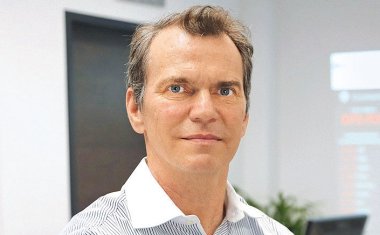Global Security Strategies of the DHL Group
In an interview with Frank Ewald, Senior Vice President, Head of Corporate Security & Crisis Management at the DHL Group, it becomes clear how the logistics industry acts as a magnifying glass for essential trends of our time. From global trade to climate change to digitalization – these factors drive the "Strategy 2030" of the DHL Group, which aims for sustainable growth. With 80 percent of revenue generated outside Germany, corporate security must keep an eye on security-relevant trends and events worldwide. In a conversation with GIT SICHERHEIT, Frank Ewald explains the challenges and strategies of corporate security.
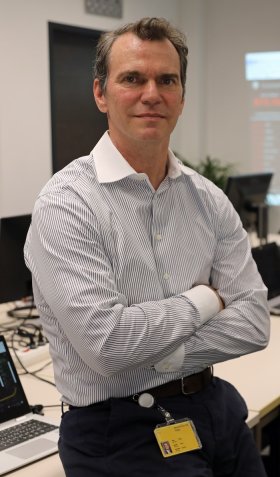
GIT SICHERHEIT: Mr. Ewald, before we talk about your own tasks and functions, let's first talk about the DHL Group itself. What once emerged from the former Deutsche Post is today a growing logistics company with soon 600,000 employees. How do your global and German activities compare in size?
Frank Ewald: It is true, over the decades, the old Deutsche Bundespost has become a globally active and very successful company: Various acquisitions like DHL, Exel, or Danzas have provided a broad portfolio of logistics services and a global footprint. And I mean that literally: Almost two-thirds of our colleagues now work outside Germany, in offices, at ports, hubs, terminals, or on the roads of their countries. We like to talk about "over 220 countries and territories" in which the DHL Group is active, because sometimes statehood is not entirely undisputed. But as a globally active logistics company, our routes and networks span the entire world. Regarding corporate revenue, it is somewhat unclear, but if we look at the Post & Parcel Germany sector – the direct heir of the Deutsche Bundespost – this sector accounted for about 20% of our annual revenue of approximately €80 billion in 2023. Conversely, this means that about 80% is generated outside Germany. This in turn means that all security-relevant trends, incidents, and tensions of this increasingly uncertain world affect us. And thus also the area of security functions of the DHL Group.
The classic post offices have largely been replaced by external operators or belong to Postbank and thus Deutsche Bank...
Frank Ewald: Yes, that is correct, but we are still intertwined in various ways. This is especially true for the nationwide network of parcel shops in Germany, which ensure very local supply in some cases. But this is also the case with the many larger partner branches of Postbank, which offer our products and services. Even though the formerly prominent post offices no longer exist, our customers can always find a DHL Group contact point nearby.
Post and parcel services as well as express and courier shipments are the largest business areas? For the latter, the DHL Group is said to have more aircraft than Lufthansa...?
Frank Ewald: That is correct – combined, Post & Parcel Germany and DHL Express account for about 50% of the company's revenue. Additionally, DHL Express continues to be highly profitable with its Time Definite services and has expanded significantly in recent years. Most of our cargo aircraft are operated there. This statement that we own more aircraft than Lufthansa, I have also heard, and it depends a bit on how you count. But it is confirmed in the case of pure cargo aircraft and the comparison to Lufthansa Cargo: Here, the DHL Group clearly leads, which is in the nature of our respective tasks – cargo transport for us; primarily passenger transport for Lufthansa. Fairly, it must also be said that Lufthansa transports a lot of "belly freight" in passenger aircraft (Editor's note: Belly freight refers to the spaces in the aircraft that are located below the passenger deck. Goods are also transported there). If you add up all subsidiaries, you can assume that Lufthansa owns and operates more aircraft.
You are the Head of Corporate Security & Crisis Management of this vast and complex company. How is security management structured at the DHL Group overall – and what are your own responsibilities?
Frank Ewald: Such a global organization requires flexibility to react quickly and effectively. A certain degree of decentralization in the division of labor is therefore absolutely essential. My department – Corporate Security & Crisis Management – represents the strategic control center at the level of the Group Functions. Here, competencies are bundled, whose specialist areas work across organizational boundaries, such as the governance of Business Continuity Management (BCM), travel security, or the global security situation center. Each of our divisions, such as the aforementioned DHL Express, has its own security area, which then handles operational security issues down to the local level. Globally, the security organizations coordinate in a steering committee and set guidelines. Holding these coordinating threads in hand, making strategic security decisions, and advising top management competently is my task.
Could you explain the self-conception and goals of corporate security and crisis management at the DHL Group in more detail?
Frank Ewald: We have recently redefined our self-conception concisely as "Prevent. Protect. Recover." We see ourselves as an essential protective function for our colleagues, our operating resources, and of course the goods entrusted to us by our customers. "Prevent" refers to our aim to avoid incidents in advance through appropriate preventive thinking, actions, and the use of technology. "Protect" then brings the first components of hardening into play: How do we minimize the impact of harmful incidents? And "Recover" is our aspiration to restore our operational processes to normal as quickly as possible after an incident. Our employees are absolutely at the center of this: If they see themselves as an active part of security and are confident in their actions, this strengthens all three aspects of our self-conception. This is the essence of our security culture at the DHL Group: We are all responsible for security, no matter what our main task is.
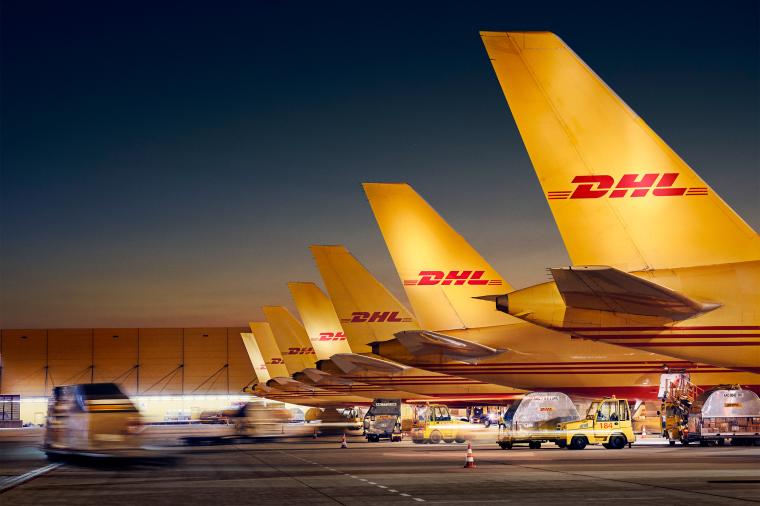
How does this translate into the strategies of corporate security?
Frank Ewald: We have just completed the process of formulating our security strategy for 2030 and derived the four strategic guidelines ("Bottom Lines") of the company: What does it mean for security to be the employer, provider, and investment of choice? And how do we define security sustainably? We have developed cross-divisional initiatives for all these bottom lines, such as harmonized security training for our employees or cross-departmental crisis management exercises. Additionally, we will prioritize certain initiatives. For example, we have actively approached selected customers as a security function and initiated close exchanges to improve cooperation. Initial feedback has been very positive. Furthermore, we have significantly expanded our geopolitical analysis capabilities, which are now proving beneficial. We are also strengthening our advisory and implementation capacities regarding security technologies. In this way, we protect our colleagues, our business, and our customers.
The understanding of corporate security today increasingly involves taking on consulting and coordinating functions within the company. Could you elaborate on how this is structured in your organization?
Frank Ewald: This is a key aspect of our work: we provide our expertise and knowledge to colleagues from all areas. Take, for example, the topic of advising on and implementing security technologies. Our security technicians are increasingly requested by divisions to plan and implement modern and resilient security technologies tailored to their needs while meeting all certification requirements or legal regulations. Through this, we have already achieved significant cost savings while maintaining high technical performance standards. As you can imagine, our colleagues are very busy. Coordination is also a central task for us. With five divisions and business-related services bundled in Global Business Services, there are many synergies to be leveraged! For instance, almost all divisions worldwide use the same security training program. This harmonizes core messages and prevents uncoordinated investments of time and money.
The term "Business Resilience" captures a trend describing holistic strategies for security management, particularly in the USA. How do you understand this term?
Frank Ewald: We understand resilience as holistic preparation for adverse events in terms of "Prevent. Protect. Recover." We recognize that we are a company built on physical and digital connections: while we have localized hubs and critical processes, we primarily operate a network of routes, paths, and data links. This impacts our approach—static protection alone is insufficient. We aim to identify and immunize critical business processes, harden our assets, contain and limit negative effects, as well as establish contingency options and redundancies where necessary—and then practice recovery responses. This forms the core of our company-wide business continuity strategy. To this end, we conduct numerous simulations annually.
You deal with diverse global risks—from political upheavals to tsunamis and other natural disasters. Could you describe how you prepare for these scenarios, gather information about them, and implement measures?
Frank Ewald: Part of this was already described under "Resilience." However, when it comes to quickly available and validated information, we operate an internal global security situation center. This center consolidates various information sources and evaluates events regarding potential impacts on the DHL Group. This may lead to local or regional measures or even activate our global crisis management team. We have also developed a crisis indicator methodology to act proactively when necessary. Regarding global disruptions mentioned earlier, we have significantly enhanced our geopolitical analysis and advisory capabilities. We monitor potential global crisis hotspots and coordinate with other corporate functions to achieve a comprehensive and balanced analysis as a basis for decision-making guidance. It’s no secret which regions of the world we focus on monitoring.
Sustainability and green transport logistics form the foundation of the 2030 Strategy
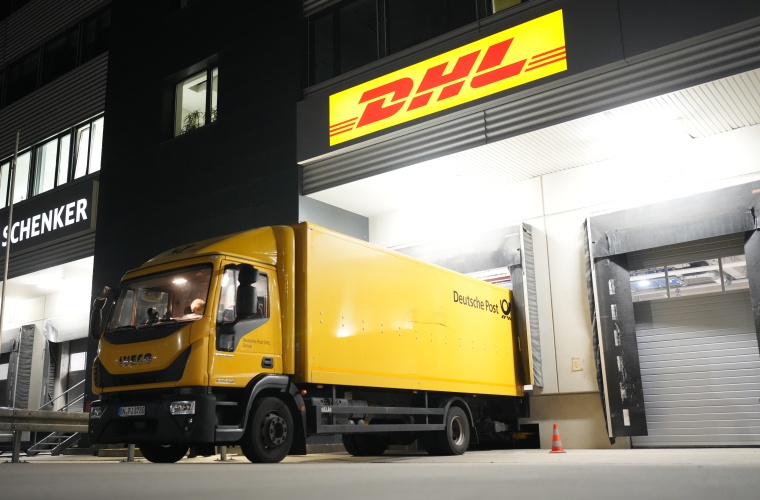

Could you provide one or two additional examples from recent history?
Frank Ewald: Take the war in Ukraine, for example: In the lead-up to the 2022 invasion, our analysts developed various scenarios of how an escalation might unfold. The eventual invasion matched one of these predicted scenarios. Another anecdote would be that our crisis response team practiced the impact of a pandemic on the company a year before COVID-19 emerged. This likely gave us a head start when the real crisis hit.
Mr. Ewald, there have been recent incidents such as the placement of incendiary devices in freight packages that were to be transported on DHL aircraft. They were difficult to extinguish and just happened to explode on the ground instead of in the air. Similar incidents have occurred in other countries and there are fears of a repeat. How have you reacted to this at DHL in terms of security precautions?
Frank Ewald: This is still an ongoing investigation. That's why I can't make a concrete statement. However, I can say that our security measures have been adapted to this phenomenon and that our company is doing everything possible to protect our employees and third parties from criminal acts.
How high is the general risk of such specific acts of sabotage - including by ad hoc agents or “low-level agents”, particularly on the part of Russian military intelligence?
Frank Ewald: I think it remains to be seen what background led to these events. In these volatile times, conclusions are drawn very quickly and connections made which then turn out to be only partially correct, or even completely wrong. In general, however, it can be said that private companies will always find it difficult to protect themselves comprehensively against professional attacks by state authorities.
IT security operates separately from corporate security at your organization, correct?
Frank Ewald: Yes, that’s correct, and it’s rooted in historical organizational structures. However, we collaborate closely at both divisional and Group levels. I personally coordinate frequently with my IT security counterpart, and many campaigns and initiatives are executed jointly. After all, we share the same protective mission, and our messaging often aligns.
To what extent are developments driven by artificial intelligence (AI) relevant to your work in corporate security?
Frank Ewald: Undoubtedly, digitalization and AI will profoundly transform our work. We’re actively leveraging the opportunities of this global megatrend, though it demands new ways of thinking from our teams. We view AI positively, using it as an efficiency driver for tasks like analyzing large datasets or conducting security audits. However, we also monitor AI’s risks. My team’s experts have scrutinized these challenges, such as the nuances of tools like DeepSeek. Balancing opportunities and risks encapsulates our approach.
What key initiatives will corporate security prioritize this year?
Frank Ewald: Given the unpredictable nature of our field, priorities can shift abruptly. Barring unforeseen events, I’ll focus heavily on advancing customer engagement in corporate security. We aim to position security as a key differentiator for the DHL Group and have planned numerous measures for 2025 to better integrate security with customer interactions, fostering trust and loyalty. Ultimately, security remains a trust-driven business.
Germany recently held elections. What expectations do you have for the new federal government, and where do you see the greatest need for action?
Frank Ewald: Having attended this year’s Munich Security Conference, I witnessed the complexities of current global challenges. While the full scope of societal pressures is still unfolding, it’s clear we must discard outdated mindsets and rebuild resilience. For businesses, reliable frameworks are critical—both economically and in meeting societal security demands. The new government’s primary task will be enabling growth while addressing these dual imperatives. It’s a monumental challenge, but urgency leaves no alternative.
Business Partner
Deutsche Post DHLCharles-de-Gaulle-Strasse 20
53113 Bonn
Germany
most read
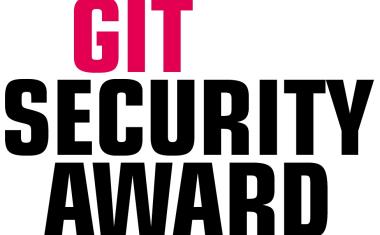
GIT SECURITY AWARD 2026 - The winners have been announced!
GIT SECURITY AWARD 2026: The best safety and security solutions of the year - now an overview of all winners

Assa Abloy's battery-powered Aperio KL100 secures lockers
Boost workplace security and operational flexibility by securing more than just doors.

Integrated and Futureproof: Traka’s Next Chapter
Interview with Stefni Oliver on Traka’s Vision for the Future

Safety and Security in an Emergency: How companies take responsibility with strategic personal protection and amok prevention
Personal protection & amok prevention: strategic concepts, training & responsibility for corporate safety and security

When the Internet stumbles: Why DNS is important
When DNS fails, the internet stumbles-AWS outage proves resilience and redundancy are vital for digital trust


